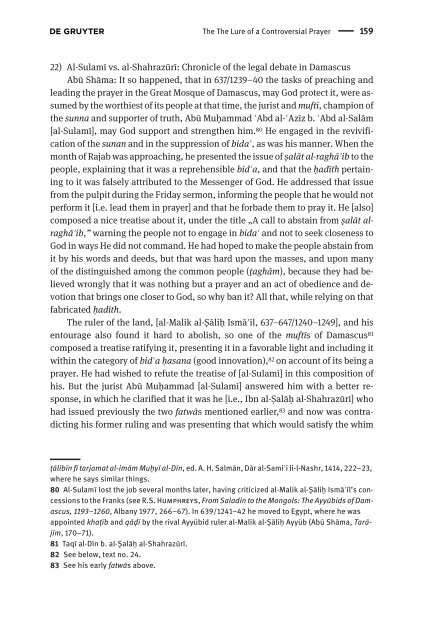0021-1818_islam_98-1-2-i-259
0021-1818_islam_98-1-2-i-259
0021-1818_islam_98-1-2-i-259
Create successful ePaper yourself
Turn your PDF publications into a flip-book with our unique Google optimized e-Paper software.
The The Lure of a Controversial Prayer 159<br />
22) Al-Sulam\ vs. al-Shahrazur\: Chronicle of the legal debate in Damascus<br />
Abu Shama: It so happened, that in 637/1239–40 the tasks of preaching and<br />
leading the prayer in the Great Mosque of Damascus, may God protect it, were assumed<br />
by the worthiest of its people at that time, the jurist and mufti, champion of<br />
the sunna and supporter of truth, Abu Mu1ammad ^Abd al-^Az\z b. ^Abd al-Salam<br />
[al-Sulam\], may God support and strengthen him. 80 He engaged in the revivification<br />
of the sunan and in the suppression of bida^, as was his manner. When the<br />
month of Rajab was approaching, he presented the issue of salat al-ragha#ib to the<br />
people, explaining that it was a reprehensible bid^a, and that the hadith pertaining<br />
to it was falsely attributed to the Messenger of God. He addressed that issue<br />
from the pulpit during the Friday sermon, informing the people that he would not<br />
perform it [i.e. lead them in prayer] and that he forbade them to pray it. He [also]<br />
composed a nice treatise about it, under the title „A call to abstain from salat alragha#ib,”<br />
warning the people not to engage in bida^ and not to seek closeness to<br />
God in ways He did not command. He had hoped to make the people abstain from<br />
it by his words and deeds, but that was hard upon the masses, and upon many<br />
of the distinguished among the common people (tagham), because they had believed<br />
wrongly that it was nothing but a prayer and an act of obedience and devotion<br />
that brings one closer to God, so why ban it? All that, while relying on that<br />
fabricated hadith.<br />
The ruler of the land, [al-Malik al-Sali1 Isma^\l, 637–647/1240–1249], and his<br />
entourage also found it hard to abolish, so one of the muftis of Damascus 81<br />
composed a treatise ratifying it, presenting it in a favorable light and including it<br />
within the category of bid^a hasana (good innovation), 82 on account of its being a<br />
prayer. He had wished to refute the treatise of [al-Sulam\] in this composition of<br />
his. But the jurist Abu Mu1ammad [al-Sulam\] answered him with a better response,<br />
in which he clarified that it was he [i.e., Ibn al-Sala1 al-Shahrazur\] who<br />
had issued previously the two fatwas mentioned earlier, 83 and now was contradicting<br />
his former ruling and was presenting that which would satisfy the whim<br />
talibin fi tarjamat al-imam Muhyi al-Din, ed. A. H. Salman, Dar al-Sami^i li-l-Nashr, 1414, 222–23,<br />
where he says similar things.<br />
80 Al-Sulamī lost the job several months later, having criticized al-Malik al-Sali1 Isma^\l’s concessions<br />
to the Franks (see R.S. Humphreys, From Saladin to the Mongols: The Ayyubids of Damascus,<br />
1193–1260, Albany 1977, 266–67). In 639/1241–42 he moved to Egypt, where he was<br />
appointed khatib and qadi by the rival Ayyubid ruler al-Malik al-Sali1 Ayyub (Abu Shama, Tarajim,<br />
170–71).<br />
81 Taq\ al-D\n b. al-Sala1 al-Shahrazur\.<br />
82 See below, text no. 24.<br />
83 See his early fatwas above.


